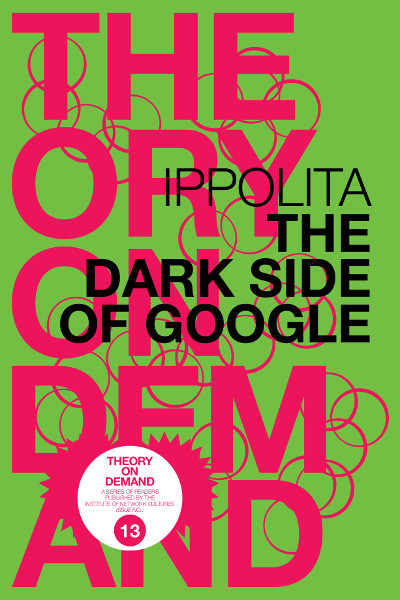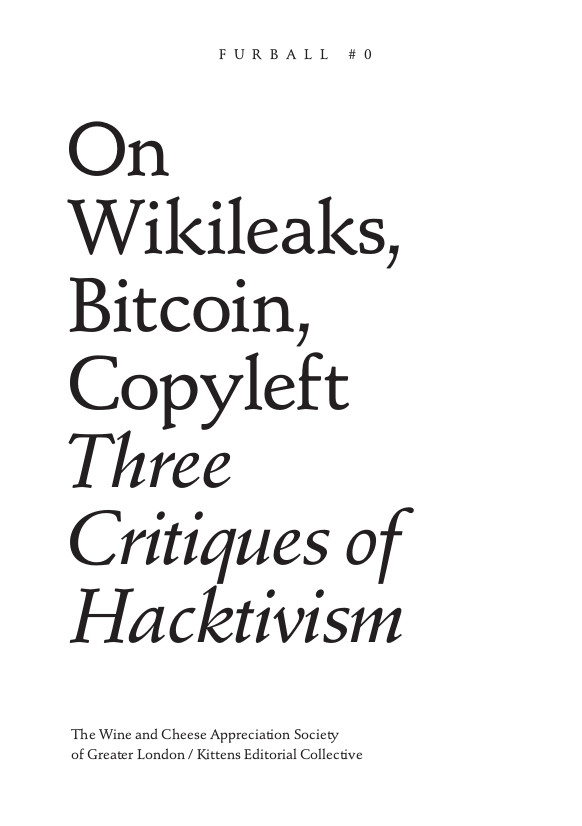Ippolita: The Dark Side of Google (2007–) [IT, FR, ES, EN]
Filed under book | Tags: · algorithm, capitalism, database, free software, google, open source, search, software, technology

In The Dark Side of Google Italian writers’ collective Ippolita provides a thorough, fresh analysis of what is behind the universe of Google and the metadata industry. In recent years Google has established itself as a major point of Internet access. We have progressively adapted to its sober, reassuring interface and its advertisements (discretely off to the side, yet always present). We have adopted its services and the habit of using it to the degree that ‘googling’ has become a form of behavior: ‘If you don’t know what it is, Google it!’
Google shows mastery in taking advantage of our need for simplicity. We sit in front of a colossus, an incredibly pervasive system of managing knowledge, comprising aggressive marketing and shrewd management of its own image, and the propagation of highly configurable interfaces that are still implacably recognizable. What is more, Google co-opts methods for developing Free Software, the use of futuristic systems for gathering and storing data. What lies behind the most consulted search engine in the world?
Italian edition
Publisher Feltrinelli, Milan, 2007
English edition
Translated by Patrice Riemens
Publisher Institute of Network Cultures, Amsterdam, 2013
Theory on Demand series, Vol. 13
Creative Commons Attribution Noncommercial No Derivative Works 3.0 Netherlands License
ISBN 9789081857567
110 pages
Luci e ombre di Google (Italian, 2007, draft)
La face cachée de Google (French, trans. Maxime Rovère, 2010, draft)
El lado oscuro de Google (Castilian, trans. Pino and Maria, 2010)
The Dark Side of Google (English, trans. Patrice Riemens, 2013)
Journal of Peer Production, No. 3: The Critical Power of Free Software (2013)
Filed under journal | Tags: · code, critique, floss, free software, hacking, software
 |
The issue explores the contemporary ability of Free Software to constitute a form of epistemological and material critique of contemporary societies. It does so with five research papers and three pieces in a “debate section”.
Contributions by Tyler Handley, Angela Daly, Douglas Haywood, Dan McQuillan, Morgan Currie/Christopher Kelty/Luis Felipe Rosado Murillo, Christopher Kelty, Katja Mayer and Judith Simon, David Hakken.
Edited by Maurizio Teli and Vincenzo D’Andrea
Published in July 2013
Open Access
ISSN 2213-5316
View online (HTML articles)
Comment (0)Furball 0: On Wikileaks, Bitcoin, Copyleft: Three Critiques of Hacktivism (2013)
Filed under booklet | Tags: · bitcoin, capitalism, copyleft, critique, free software, hacktivism, money, software, wikileaks

“While most expressions of hacktivism lack this revolutionary vigour expressed in one of the later communiques by now infamous hacking collective AntiSec, hacktivism is widely appreciated for its radical potential. Wikileaks and hacking crews are considered by some as anarchist special forces striking blows against the forces of domination. Bitcoin is regarded as a practical approach to break the power of capital. Free software is thought of as a model for future production beyond capitalism. We disagree.
This booklet collects our writings on activism in the digital realm produced over the last few years. In our piece on Wikileaks — which first appeared in Kittens #1 — we critique Wikileaks’ appreciation of the bourgeois-democratic state which persecutes it. The article on Bitcoin — which previously appeared in Mute Magazine Vol. 3, No. 3 — deals with the political economy of the digital currency and critiques the Libertarian ideology driving it. Finally, our piece on free software and other digital commons — which has not previously been published — portrays how ‘copyleft’ software licences are still expressions of appreciation for the social conditions we are forced to live under.
All three pieces critique both the fallacies inherent in the reasoning behind these projects as well as left-wing hopes attached to them. As such, it might strike the reader as arrogant sneering from the sidelines. However, this is not the intent of this work. We hold that the project of transforming the existing social conditions must start from a correct understanding of these conditions to avoid reproducing them. In this spirit, this booklet is an invitation to critique.” (from the Foreword)
Publisher The Wine & Cheese Appreciation Society of Greater London, London, January 2013
46 pages
via Marcell, via Anthony

